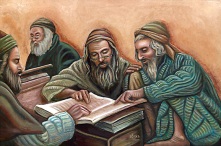Musings from Students of the Pardes Institute of Jewish Studies in Jerusalem
Posted on June 23, 2013 by The Director of Digital Media
X-posted from Eryn's blog post:
 Eryn London (Summer ’06 & ’07, Community Education ’10, Year ’10-’11, Hourly ’11-’12) made Aliya from New Jersey three years ago. She is currently studying in the Manhiga Hilchatit Program at Midreshet Lindenbaum, which is a 5 year advanced Halacha learning program. Beyond learning she also runs activities at a nursing home, teaches theatre, and directs plays on the side.
Eryn London (Summer ’06 & ’07, Community Education ’10, Year ’10-’11, Hourly ’11-’12) made Aliya from New Jersey three years ago. She is currently studying in the Manhiga Hilchatit Program at Midreshet Lindenbaum, which is a 5 year advanced Halacha learning program. Beyond learning she also runs activities at a nursing home, teaches theatre, and directs plays on the side.
The brand-new Divrei Mahamal blog is written by the women that are currently studying in the Manhiga Hilchatit Program. The blog should be updated weekly by one of the women. The d’vrei Torah will be written in English, Hebrew or French.
Over the past couple of months I have been studying Daf Yomi, and I have come to finishing Mesechet Eruvin. At first I tried to convince myself that it will be over soon, because the laws of Eruv are not necessarily the most exciting in the world. But as the months grew on, it became closer to the summer and going to camp, which is where I am now.
In camp, my job is to be a teacher, to engage campers in Jewish learning; to make Judaism exciting; to make it something that is not just what they have to do in school, but rather something that they do and want to do in their everyday life.
Towards the end of the mesechet, we learn about what happens if one finds a book that is found between a karmalit and a reshut harabim. One of the answers as to why one would be allowed to pick up the book caught my eye.
The Gemara states: “That actually the case is of a threshold that is not long, yet we are not concerned that he might come to carry the entire scroll directly from the rushut harabim into the rushut hayachid, because generally one who picks up Holy books peruse them before putting them down.” (Eruvin 98a)
This image that one cannot help but pick up a Jewish book and “peruse before putting it down” really stuck in my head, certainly as a Jewish educator, and especially being one in camp.What does it means that “generally one who picks up Holy books peruse them before putting them down?” And what I could learn from this?
I see Jewish books laying about and having a special magnetic pull, automatically engaging Jewish people. People passing by are unable to resist the urge of picking up the book and scanning it, even for a few seconds.
The quote reminds me of the lesson in Perkei Avot, where Shamai teaches, “Make the study of Torah fixed” (Perkei Avot 1:15). When something is fixed in one’s life, it becomes ingrained. It becomes something that we look for when we encounter a new situation. It becomes a form of comfort. If Torah is something that is fixed, then one will be drawn to even scanning a book that they find to once more experience that feeling of comfort.
Thus it is important for those of us who see ourselves as educators—in any sense of the word—to make Torah learning not only something that is fixed but also engaging so that our students and children will have the uncontrollable desire to constantly be perusing other books, to connect even more deeply to the Torah and HaShem.
-Eryn London